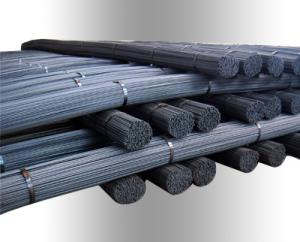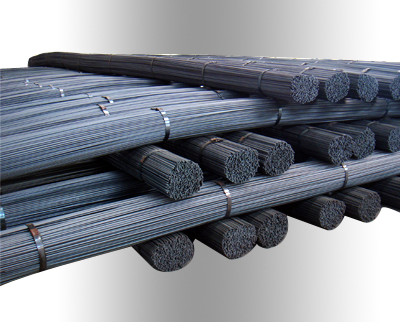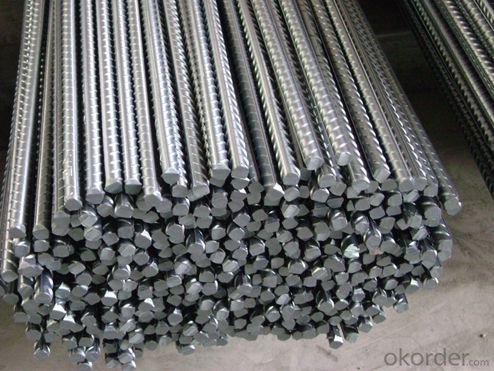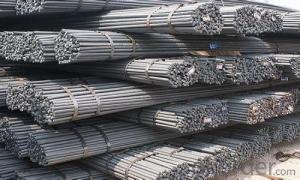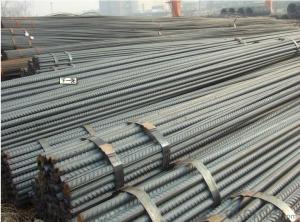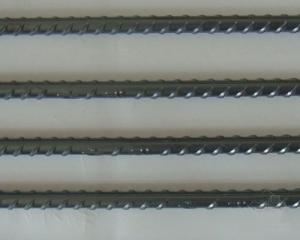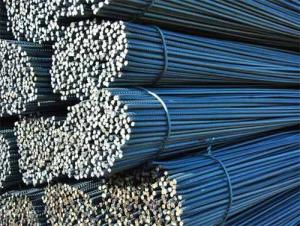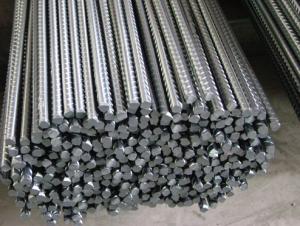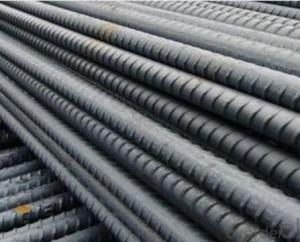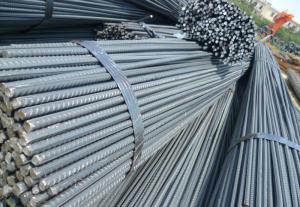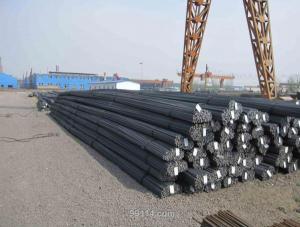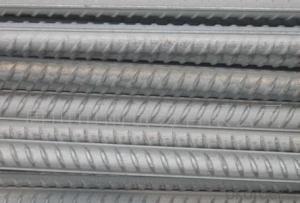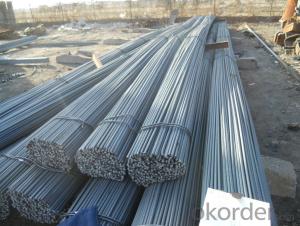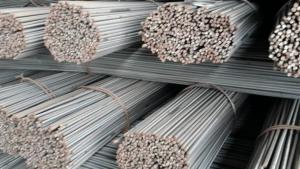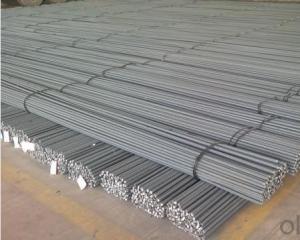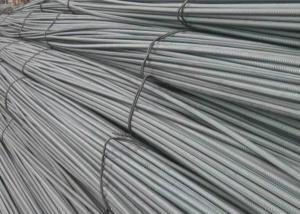Nine mm Cold Rolled Steel Rebars with High Quality
- Loading Port:
- Tianjin
- Payment Terms:
- TT or LC
- Min Order Qty:
- 100 m.t.
- Supply Capability:
- 15000 m.t./month
OKorder Service Pledge
OKorder Financial Service
You Might Also Like
Specifications of Nine mm Cold Rolled Steel Rebars with High Quality:
Name | Cold Rolled Steel Rebar | |
Diameter | 5mm,5.5mm,6mm,6.5mm,7mm,8mm,9mm,10mm, 11mm,12mm, | |
Length | 6M, 9M,12M or as required | |
Price | Keep lower operating costs so as to offer competitive price for our clients | |
Label | to be specified by customer, generally, each bundle has 1-2 labels | |
Application | Building, construction | |
Invoicing | Actual or Theoretical Weight Basis as buyer’s request. | |
Theoretical weight and section area of each diameter of Nine mm Cold Rolled Steel Rebars with High Quality as below for your information:
Diameter(mm) | Section area (mm²) | Mass(kg/m) | Weight of 12m (kg) | Pcs/ton |
9 | 63.6 | 0.499 | 5.988 | 167 |
Packaging & Delivery of Nine mm Cold Rolled Steel Rebars with High Quality:
Packaging Detail: products are packed in bundle and then shipped by container or bulk vessel, deformed bar is usually naked strapping delivery, when storing, please pay attention to moisture proof. The performance of rust will produce adverse effect.
Each bundle weight: 2-3MT, or as required
Payment terms: TT payment in advance or Irrevocable LC at sight.
Trade terms :FOB, CFR, CIF
Delivery Detail: within 45 days after received advanced payment or LC.
FAQ:
Q1: Why buy Materials & Equipment from OKorder.com?
A1: All products offered byOKorder.com are carefully selected from China's most reliable manufacturing enterprises. Through its ISO certifications, OKorder.com adheres to the highest standards and a commitment to supply chain safety and customer satisfaction.
Q2: How do we guarantee the quality of our products?
A2: We have established an advanced quality management system which conducts strict quality tests at every step, from raw materials to the final product. At the same time, we provide extensive follow-up service assurances as required.
Q3: How soon can we receive the product after purchase?
A3: Within three days of placing an order, we will arrange production. The shipping date is dependent upon the quatity, how many sizes you want and the plan of production, but is typically 1 month to 2 month days from the beginning of production.
Images of Nine mm Cold Rolled Steel Rebars with High Quality:
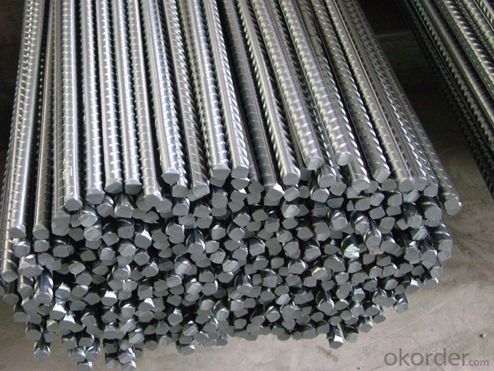
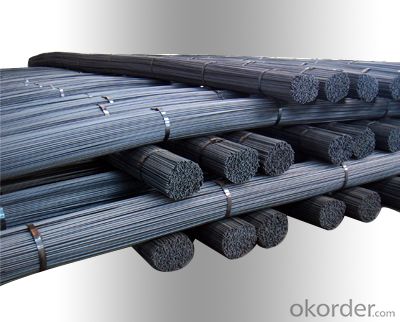
- Q: Can steel rebars be used in foundations and footings?
- Yes, steel rebars can certainly be used in foundations and footings. In fact, they are commonly used in these applications due to their high tensile strength and durability. Steel rebars, which are typically made of carbon steel, are used to reinforce concrete structures and enhance their resistance to tension and bending forces. The rebars are placed within the concrete to provide additional strength and prevent cracking or failure under heavy loads. Therefore, using steel rebars in foundations and footings is a standard practice in construction to ensure the stability and longevity of the structure.
- Q: What is the impact strength of steel rebars?
- Steel rebars' impact strength can vary based on factors like steel composition, manufacturing process, and rebar grade. However, steel rebars are generally renowned for their high impact strength, enabling them to endure significant forces and impacts without fracturing or breaking. In construction projects, steel rebars are frequently employed to reinforce concrete structures and provide added strength. Their exceptional impact strength enables them to withstand heavy loads, vibrations, and even extreme weather conditions. The impact strength of steel rebars is vital in guaranteeing the structural integrity and safety of buildings and infrastructure. They play a pivotal role in preventing building collapse under stress, for instance, during earthquakes or when subjected to heavy loads. Furthermore, steel rebars can absorb and distribute impact energy throughout the structure, minimizing the likelihood of localized damage. In summary, the impact strength of steel rebars is a crucial factor in determining their suitability for various construction applications. Engineers and architects carefully evaluate this property when selecting the appropriate grade and size of steel rebars to ensure the durability and safety of their designed structures.
- Q: What is the typical weight per meter of a steel rebar?
- The typical weight per meter of a steel rebar can vary depending on the diameter and thickness of the rebar. However, on average, a steel rebar weighs around 0.75 kilograms per meter.
- Q: Can steel rebars be recycled after the demolition of a structure?
- Yes, steel rebars can be recycled after the demolition of a structure. Steel is one of the most commonly recycled materials in the world, and rebars are no exception. During the demolition process, rebars are typically removed from the structure and separated from other materials such as concrete. The rebars are then collected and sent to a recycling facility where they are processed and melted down. The melted steel can be used to create new rebars or other steel products, reducing the need for virgin steel production and conserving valuable resources. Recycling rebars not only helps to reduce waste and minimize environmental impact but also contributes to the circular economy by promoting the reuse of materials.
- Q: Can steel rebars be used in cold weather conditions?
- Yes, steel rebars can be used in cold weather conditions. Steel has excellent cold weather performance and can maintain its structural integrity even in extremely low temperatures. However, it is important to ensure that proper construction practices are followed, such as protecting the rebars from moisture and using appropriate concrete curing methods to prevent freezing and cracking.
- Q: How are steel rebars transported and stored on construction sites?
- Trucks or trailers are typically used to transport steel rebars to construction sites. These vehicles are specifically designed to safely carry and unload the heavy and bulky rebars. When the rebars arrive at the site, they are usually offloaded using cranes or forklifts. To make storage and access more efficient, rebars are often kept in designated areas known as rebar yards. These yards are typically organized in a manner that allows for easy identification and retrieval of rebars when needed. The rebars are sorted and stacked according to their size, length, and type to avoid any confusion during construction. In the rebar yard, rebars are commonly stored horizontally on racks made of steel or wood. These racks are designed to provide proper support and prevent any damage to the rebars. It's important to note that rebars should be stored above ground level to protect them from moisture, rust, and contamination. They should also be kept away from damp areas and direct contact with soil. To maintain the quality of the rebars, it's crucial to protect them from rain, snow, and excessive sunlight. Therefore, construction sites often utilize protective covers like tarps or plastic sheets to shield the rebars and prevent any corrosion or deterioration. Additionally, construction workers must handle rebars with care to avoid bending or deformation. Special attention should be paid to prevent dropping or dragging of rebars, as it can compromise their structural integrity. Overall, careful planning and adherence to safety guidelines are necessary for the transportation and storage of steel rebars on construction sites. This ensures the rebars maintain their quality and effectiveness in reinforcing concrete structures.
- Q: Can steel rebars be used in pre-stressed concrete elements?
- Yes, steel rebars can be used in pre-stressed concrete elements. Rebars are often used to provide additional reinforcement and strength to pre-stressed concrete structures, helping to counteract the tensile forces that may be induced during the pre-stressing process.
- Q: Can steel rebars be used in structures with high moisture content in the environment?
- Steel rebars can be used in structures with high moisture content in the environment, but certain precautions need to be taken to prevent corrosion. Moisture can accelerate the corrosion process of steel, leading to structural integrity issues over time. To mitigate this risk, several measures can be implemented. Firstly, the use of corrosion-resistant steel rebars, such as stainless steel rebars, can be considered. These rebars are specifically designed to resist corrosion in high-moisture environments, making them suitable for structures exposed to moisture. Secondly, proper concrete cover thickness should be maintained to protect the rebars from direct contact with moisture. Adequate concrete cover acts as a barrier, preventing moisture from reaching the steel surface and reducing the risk of corrosion. Additionally, the use of waterproofing materials and coatings can be beneficial in preventing moisture ingress into the structure. These materials create a protective layer on the surface of the concrete, preventing water penetration and reducing the likelihood of corrosion. Regular inspection and maintenance are crucial for structures in high-moisture environments. Periodic inspections can help detect any signs of corrosion or damage early on, allowing for timely repairs or preventive measures. In conclusion, while steel rebars can be used in structures with high moisture content, it is important to implement appropriate measures to prevent corrosion. Using corrosion-resistant rebars, maintaining proper concrete cover, and applying waterproofing materials can significantly enhance the durability and longevity of structures in such environments.
- Q: How are steel rebars manufactured?
- Steel rebars are manufactured through a process called rolling, where steel billets are heated and passed through a series of rollers to shape them into the desired rebar sizes and profiles. This process ensures the rebars have the necessary strength and durability for construction purposes.
- Q: How are steel rebars installed in concrete structures?
- Steel rebars are installed in concrete structures by first determining the required placement and spacing of the rebars. The rebars are then cut to the desired length and placed in the formwork before pouring the concrete. The rebars are secured in place using wire ties or metal supports to prevent displacement during the concrete placement. Once the concrete has cured, the rebars become an integral part of the structure, providing reinforcement and strength.
Send your message to us
Nine mm Cold Rolled Steel Rebars with High Quality
- Loading Port:
- Tianjin
- Payment Terms:
- TT or LC
- Min Order Qty:
- 100 m.t.
- Supply Capability:
- 15000 m.t./month
OKorder Service Pledge
OKorder Financial Service
Similar products
Hot products
Hot Searches
Related keywords
